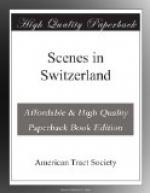This being arranged, we took a last drive around the environs of the city; the views of the lake and of the mountains in every direction, were enchanting and sublime. From the head of the lake, a greater variety of interesting objects met the eye than can be seen perhaps from any other spot in Europe. At your feet you behold a venerable and populous city; while a vast and beautiful lake spreads its clear waves beyond, amid a landscape rich in all the products a cultivated soil can furnish; while vast and gloomy mountains stretch their giant forms on high. In clear weather, Mont Blanc appears the venerable monarch of the Alps. Below this, Saleve rises to upwards of three thousand feet, with the uninterrupted length of the Jura on the left, whose highest point is over four thousand. Proceeding along the banks of the Arve, we at length alighted at the entrance of a thicket, through which we made our way with difficulty, the path being hilly and very slippery, to a place where we saw at our feet the celebrated junction of the Arve and the Rhone. The Arve has a thick soapy appearance; the Rhone is of a fine dark green, and seems for a while to spurn a connection with its muddy visitor. For two or three miles the Rhone keeps up its reserve, and the rivers roll side by side, without mingling their waters. At length they meet and blend: the distinction is lost, the polluted Arve is absorbed in the haughty and majestic Rhone.
We were to leave Geneva the next morning. Before night our guide came: he was ill, would we take his son? The proposition did not please us; it was a dangerous journey, and many had been lost in the mountain passes.
“Erwald knows as much of the passes as I do,” said the father, “and he is anxious to go; his sister lives at Maglan, and she is down with the fever.”
I saw how it was. Erwald was to go to Maglan to visit his sister; and if the father could arrange for him to go with us, of course he himself would be free to make another engagement.
“Do you feel sure that you can guide us safely?” I asked of Erwald.
“Certainly, monsieur; I have been over the way many times. If I was not quite sure, I would not offer to go.”
“Not if you could gain a good many francs by going?”
“It would not be right to say to you that I knew the way, if I did not.”
The boy’s face was attractive, his voice gentle, and his blue eyes full of tenderness. His look and his answer delighted me.
“No, it would not be right, Erwald; and because you love the right and feel sure that you can serve us, I will take you in your father’s place.”
“I am glad, very glad; and now I must see my mother. Vesta is sick and she will be glad to see any one from home.”
Erwald’s face was glowing; I turned to the father.
“Erwald is a good child,” he said. “At first we felt vexed with him and Vesta for leaving the church, and not a few times did we punish them. But they were so good and patient that it troubled us; and now their mother is a Protestant, and I never go to mass.”




